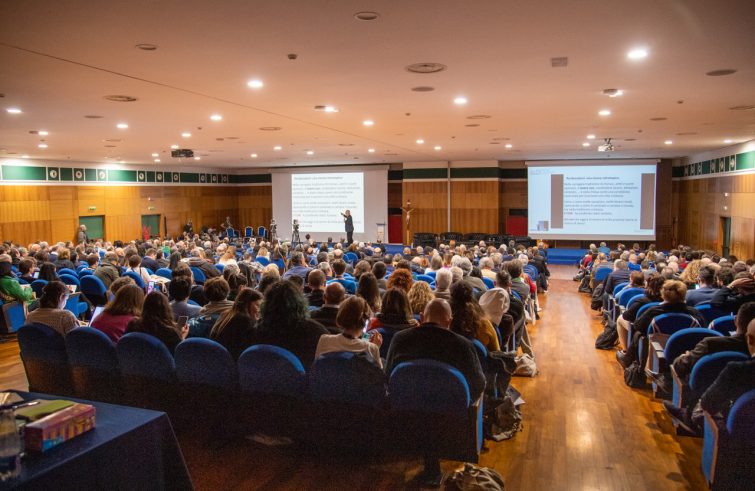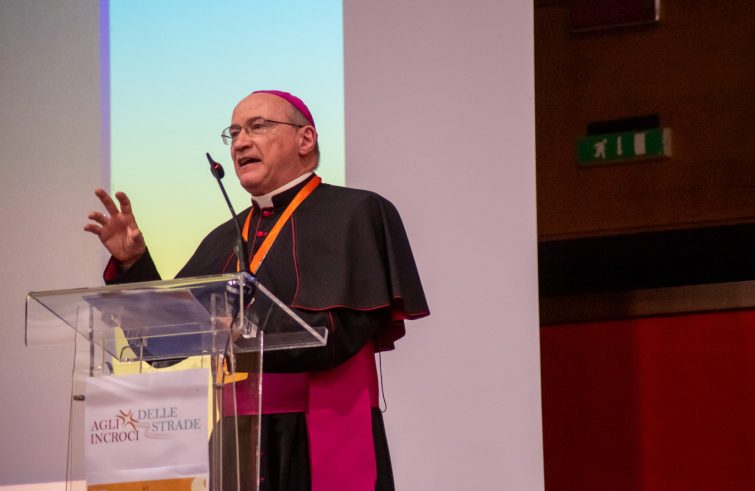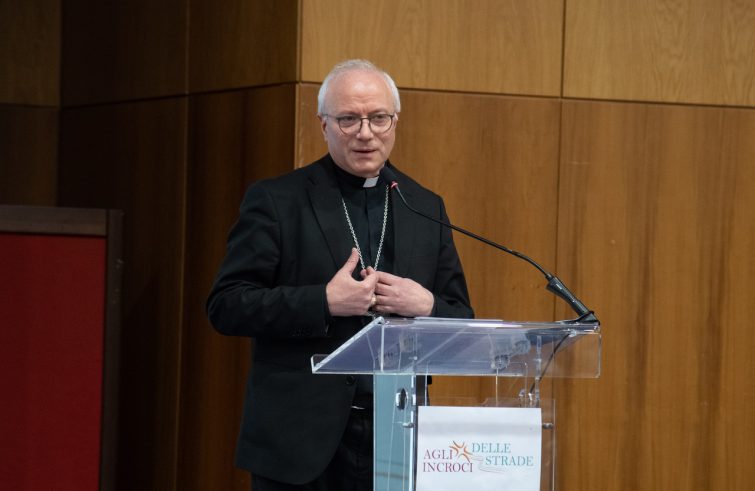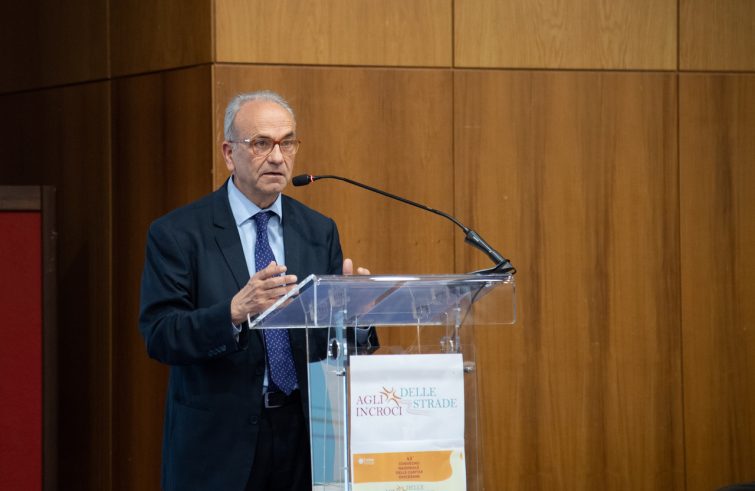
Migration “is not an emergency; it is a reality that requires a rational, realistic and innovative approach. It is not a problem to be solved but a reality whose complexities require governance, focusing on a variety of values that include protection of human life – a person that risks dying must be rescued; human dignity, the yearning for peace, justice and a better life.” Monsignor Carlo Roberto Maria Redaelli, Archbishop of Gorizia, President of Caritas Italy, addressed in clear terms the sensitive topic of migration in his opening speech for the 43rd Convention of the Italian Diocesan Caritas, ongoing in Salerno April 17-20. A total of 660 delegates representing 173 dioceses convened in the city located in the Campania region to reflect on the theme “Intersections. Inhabiting the territory, inhabiting relationships.”
 “On the subject of integration we believe that migrants should be protected by laws and not restricted by them. Major efforts – and patience – are needed to eradicate the causes of forced migration,” the president of Caritas Italy pointed out:
“On the subject of integration we believe that migrants should be protected by laws and not restricted by them. Major efforts – and patience – are needed to eradicate the causes of forced migration,” the president of Caritas Italy pointed out:
“We want to serve the poor, to voice their needs to national institutions and Churches on behalf of the poor.”
 Monsignor Giuseppe Baturi, Archbishop of Cagliari, General Secretary of the Italian Bishops’ Conference, gave a detailed explanation of the charity principle. “Caritas’ commitment – he said – has the beautiful effect of kindling works of charity within each community,” he said. “Man’s well-being does not solely depend on the solution to his problems, it also stems from community contexts marked by compassion and closeness”, he remarked. Moreover, he added, “it would be beautiful if solidarity could be extended to other world communities, in Syria, in Lebanon, in Africa.” The prelate called on all ecclesial communities to undertake a “personal commitment to meet the poor. This is where Caritas must extend its helping hand.” “Man’s needs always have a name and a face, as the Pope says, meaning that our gaze must grasp the wholeness of human needs, not only the need for bread but also the need for friendship, for companionship. The relationship with the person in need cannot but lead to a social and political commitment, for a person’s wellbeing also depends on the context in which he or she lives. To be neighbour means to be shareholder of a society. There ensues that our love for humanity inevitably entails the ability to denounce injustice and rebuild a new development model. Yet, three years after the pandemic, during which we had high hopes for a change, it is fair to say that that resolution failed its purpose.”
Monsignor Giuseppe Baturi, Archbishop of Cagliari, General Secretary of the Italian Bishops’ Conference, gave a detailed explanation of the charity principle. “Caritas’ commitment – he said – has the beautiful effect of kindling works of charity within each community,” he said. “Man’s well-being does not solely depend on the solution to his problems, it also stems from community contexts marked by compassion and closeness”, he remarked. Moreover, he added, “it would be beautiful if solidarity could be extended to other world communities, in Syria, in Lebanon, in Africa.” The prelate called on all ecclesial communities to undertake a “personal commitment to meet the poor. This is where Caritas must extend its helping hand.” “Man’s needs always have a name and a face, as the Pope says, meaning that our gaze must grasp the wholeness of human needs, not only the need for bread but also the need for friendship, for companionship. The relationship with the person in need cannot but lead to a social and political commitment, for a person’s wellbeing also depends on the context in which he or she lives. To be neighbour means to be shareholder of a society. There ensues that our love for humanity inevitably entails the ability to denounce injustice and rebuild a new development model. Yet, three years after the pandemic, during which we had high hopes for a change, it is fair to say that that resolution failed its purpose.”
 Monsignor Antonio Di Donna, bishop of Acerra, president of the Bishops’ Conference of the Campania Region (CEC), spoke on behalf of the bishops of Campania and of its 23 diocesan Caritas centres. He raised the issue of environmental pollution in the so-called ‘Terra dei fuochi’, (Land of Fires), a territory located between Naples and Caserta. “Campania opened a pandora box of tragedy, bringing to light the deaths of young people and adults,” he remarked. “The ecclesial journey we have been pursuing for years – notably those ten dioceses affected by the plight of environmental pollution – should serve as a model for other Churches in Italy.” In fact, education and the care of Creation go hand in hand with denunciation and dialogue with the institutions. But that is not all. “There must be an end to this infamous and defamatory stigma concerning our territory alone,” he reiterated. “There are over 50 contaminated sites in Italy, evenly distributed in the north, centre and south of the country, so our approach could be useful for other areas of Italy struggling with the problem of environmental pollution.” The president of the Campania bishops then addressed the migratory issue, notably the reception of migrants, considering that Salerno welcomes migrant vessels at the port on a regular basis and the dioceses are in the forefront of efforts to assist them: “This issue is described as an emergency, as an invasion of migrants,” he said, “but the intellectual dishonesty is such that the scientific data being presented is not even taken into account.”
Monsignor Antonio Di Donna, bishop of Acerra, president of the Bishops’ Conference of the Campania Region (CEC), spoke on behalf of the bishops of Campania and of its 23 diocesan Caritas centres. He raised the issue of environmental pollution in the so-called ‘Terra dei fuochi’, (Land of Fires), a territory located between Naples and Caserta. “Campania opened a pandora box of tragedy, bringing to light the deaths of young people and adults,” he remarked. “The ecclesial journey we have been pursuing for years – notably those ten dioceses affected by the plight of environmental pollution – should serve as a model for other Churches in Italy.” In fact, education and the care of Creation go hand in hand with denunciation and dialogue with the institutions. But that is not all. “There must be an end to this infamous and defamatory stigma concerning our territory alone,” he reiterated. “There are over 50 contaminated sites in Italy, evenly distributed in the north, centre and south of the country, so our approach could be useful for other areas of Italy struggling with the problem of environmental pollution.” The president of the Campania bishops then addressed the migratory issue, notably the reception of migrants, considering that Salerno welcomes migrant vessels at the port on a regular basis and the dioceses are in the forefront of efforts to assist them: “This issue is described as an emergency, as an invasion of migrants,” he said, “but the intellectual dishonesty is such that the scientific data being presented is not even taken into account.”
 Carlo Borgomeo, president of Fondazione Con il Sud, highlighted the long-standing question of the south of Italy. “In the South, the development policies underlying 72 years of extraordinary interventions to bridge the North-South divide proved to be flawed,” he said in no uncertain terms. The per capita GDP of a citizen of the South rose only from 52.9 per cent to 56.3 per cent: “This is a blatantly missed target.” In his view, “there can be no sound and lasting development without adequate social capital”, and therefore, “a radical discontinuity in development policies is essential”, which means investing in “social capital” and “Third Sector organisations.” “More than once,” he said, “the development policies of the South of the country failed their purpose. I can testify to the fact that Caritas has proved to be the most relevant social infrastructure network in Southern Italy on numerous occasions”, he said, “but the old Welfare State based on compensation and of a completely public nature doesn’t work anymore.”
Carlo Borgomeo, president of Fondazione Con il Sud, highlighted the long-standing question of the south of Italy. “In the South, the development policies underlying 72 years of extraordinary interventions to bridge the North-South divide proved to be flawed,” he said in no uncertain terms. The per capita GDP of a citizen of the South rose only from 52.9 per cent to 56.3 per cent: “This is a blatantly missed target.” In his view, “there can be no sound and lasting development without adequate social capital”, and therefore, “a radical discontinuity in development policies is essential”, which means investing in “social capital” and “Third Sector organisations.” “More than once,” he said, “the development policies of the South of the country failed their purpose. I can testify to the fact that Caritas has proved to be the most relevant social infrastructure network in Southern Italy on numerous occasions”, he said, “but the old Welfare State based on compensation and of a completely public nature doesn’t work anymore.”










